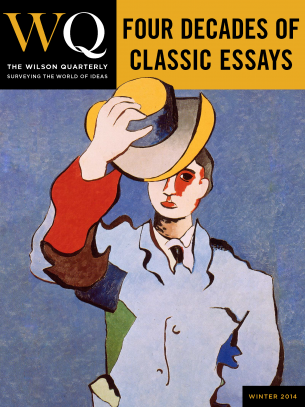Four Decades of Classic Essays


Mario Vargas Llosa was one of several Latin American and Soviet novelists who came to the Wilson Center as visiting scholars during the politically tumultuous decades at the end of the 20th century. In this essay from the WQ’s Spring 1987 issue, Vargas Llosa reflected on freedom’s intimate connection to literary imagination.
With the debate about globalization focused on economics and politics, Amy Chua raised an alarm in our Autumn 2002 issue about the dangerous escalation of ethnic tensions in many countries caused by the triumph of free-market democracy. Chua later wrote Battle Hymn of the Tiger Mother (2011).
The decline of civility was a relatively new concern when we published this historical perspective on the phenomenon in the Autumn 1996 issue. The introduction we wrote then is perhaps even more apt today: “A democracy, more than any other society, is built on mutual trust and cooperation among strangers, on the street as well as in the meeting hall. Creating and sustaining such trust was an important public commitment of America’s early years—one that we seem increasingly unable to make.”
On the 10th anniversary of the triumphant end of the Persian Gulf War, and only months before 9/11, Andrew J. Bacevich wrote this prophetic critique of the new conception of America’s role in the world he said had emerged from the victory. Bacevich wrote a number of articles for the WQ after he retired as a colonel from the Army in the 1990s.
In an age of ceaseless technological change, the need for historical and ethical perspective on public questions is greater than ever.
During the 1990s, the WQ published a regular poetry feature edited by a series of distinguished poets, who selected and introduced the works of other writers past and present. After the death of our first poetry editor, the Nobel laureate Joseph Brodsky, Anthony Hecht, one of his successors, published this tribute.
One of the most popular Wilson Quarterly essays ever (and by far the funniest) was Anders Henriksson’s brief history of Europe as told through the peculiar observations he had culled from papers written by college freshmen he had taught in Canada. As we wrote in introducing the piece in the Spring 1983 issue, paraphrasing George Santayana, “Those who forget history are condemned to mangle it.”
America's nuclear arsenal isn't dangerous, but getting rid of it might be.
History says reductions in defense spending often concentrate the minds of American strategists in beneficial ways.
If you want to fight big government, you have to stop fighting wars.
Liberals and conservatives share the same enemy: byzantine government programs.
Economists should stop ignoring the moral and ethical dimensions of their theories.
Novels, like movies, weren't always a medium for serious, creative expression.
Mom and Dad encourage a “leisurely stroll” toward adulthood.
Some Holocaust survivors have returned to the concentration camps, this time as visitors.
Our newest public intellectuals are little more than cynical, polished speakers on the Silicon Valley circuit.
Why did Israel fail to anticipate the Yom Kippur War?